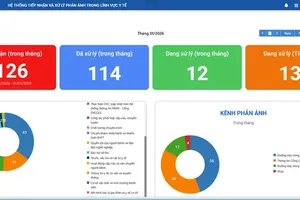 Children are very susceptible to influenza B
Children are very susceptible to influenza B
Most cases of influenza infection are not highly virulent strains, but the fact that the infectious disease surveillance system shows that the number of hospitalized cases with influenza tended to increase recently, especially in large hospitals. Patients infected with the flu have lately suffered complications such as pneumonia, encephalitis, and central nervous system damage requiring mechanical ventilation in infirmaries’ intensive care units.
According to health experts, from October to December every year, the continuing change in the Earth's climate will affect the viral activity and transmission of influenza. On the other hand, the changing pattern of common respiratory and enteric viruses has been leading to an increase in seasonal flu cases, increased hospitalizations, and deaths.
In just a short time, more than 730 students in the Northern Province of Bac Kan’s in Cho Don District had high fever due to flu, including one death of an 8-year-old student. According to Mr. Tac Van Nam, Director of Bac Kan Province's Department of Health, the number of children with high fever due to influenza began sporadically from the beginning of October and peaked from October 20 to now; consequently, 667 children had to miss their schools.
The provincial Center for Disease Control took seven samples from children with a high fever who had to be hospitalized for treatment and transferred to the Central Institute of Hygiene and Epidemiology for testing. Test results have shown that they were positive for influenza B.
 Adults with weakened immune systems are very susceptible to seasonal influenza
Adults with weakened immune systems are very susceptible to seasonal influenza
Although influenza B is a common infectious disease, it still has serious complications without early detection and proper treatment, said Mr. Tac Van Nam.
He said that the flu outbreak in Cho Don District has been currently controlled and the risk of influenza B spread was curbed. Of 667 children, only more than 60 of them are being treated in medical clinics in stable health.
Not only Bac Kan Province, but also many hospitals in Hanoi city also recorded a very high number of flu patients coming to the hospital for examination and hospitalization. Specifically, the Pediatrics Department of the Hanoi-based Dong Da General Hospital daily admitted 70-80 children with flu with symptoms such as cough, fever, sneezing, runny nose, and headache.
Elsewhere in Hanoi, Saint Paul Hospital and Thanh Nhan Hospital also received 100 patients infected with influenza a day.
More worryingly, recently in Phu Tho Province’s Dong Thanh Commune, a 5-year-old girl has been infected with bird flu. This is the first case of avian influenza in humans reappearing in Vietnam after 8 years and is also the flu with a very high risk of severe progression with a mortality rate of 50 percent-60 percent.
According to medical experts, the seasonal influenza virus group is classified into strains A, B, and C; in which influenza strains A and B are capable of spreading rapidly, causing large epidemics. Notably, the symptoms of seasonal flu are difficult to distinguish from other respiratory illnesses due to similar manifestations, such as fever, headache, muscle aches, fatigue, runny nose, sore throat and cough.
In addition, the seasonal patterns are changing, and the weather changes erratically, so the number of children suffering from respiratory diseases tends to increase, especially the elderly and children are very susceptible to influenza B.
Dr. Ta Anh Tuan, Head of the National Children's Hospital’s Internal Medicine Intensive Care Department, said that people with flu can spread it to others. Most experts think that flu viruses spread mainly by droplets made when people with flu cough, sneeze or talk. These droplets can land in the mouths or noses of people who are nearby (usually within about 6 feet away) or possibly be inhaled into the lungs. Children who touch surfaces contaminated with droplets containing the flu virus and then touch their mouth, nose, or eyes can also spread the disease.
While the general incubation period for the flu is usually between one and four days, this period can vary from person to person. The longer incubation period in infants and people with weakened immune systems may be due to their weaker febrile response to the virus, leading to prolonged symptom onset.
In addition to typical symptoms such as fever and runny nose, children with the flu can also have gastrointestinal symptoms comprising nausea, vomiting, and diarrhea. Most children will recover in one or two weeks, but cough and fatigue can last for more than two weeks.
According to Dr. Ta Anh Tuan, most cases of flu are mild and will go away on their own within two weeks, but the virus can also cause serious complications, such as pneumonia caused by influenza virus or bacterial superinfection. Other complications are rarer such as myocarditis, encephalitis, and multi-organ failure.
Therefore, to reduce the risk of flu and its potentially serious complications, medical workers recommend that everyone especially children should get a seasonal flu vaccine every year. Moreover, people should keep a distance of at least 1m from people with flu symptoms. When a young child has flu symptoms, their parents should keep him/her at home without sending them to their schools.
Last but not least, children should eat cooked and drink boiling water, ensuring food hygiene and safety, and maintaining a reasonable diet to improve resistance. Meanwhile, to prevent avian influenza infection in humans, it is absolutely necessary not to contact, slaughter, and eat dead or sick poultry.
On October 31, the Center for Disease Control of Ho Chi Minh City said that the southern largest city has not recorded any signs of an increase or abnormality in influenza. Medical workers advised people to go to nearby medical facilities for timely diagnosis and treatment if they experience flu symptoms.
Furthermore, people should not buy flu test kits as well as not self-medicate by taking Tamiflu to treat the disease. The arbitrary use of Tamiflu will increase the risk of drug resistance, leading to unwanted effects and economic losses.
























